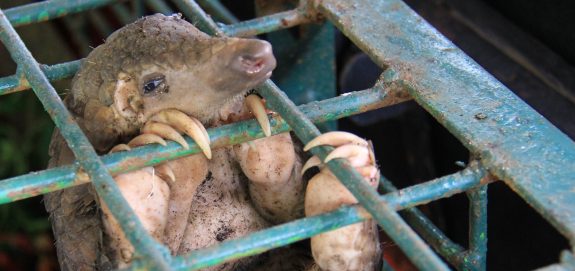Millions of wild animals are captured and traded each year for human entertainment, food, and traditional medicine, and for the exotic pet trade. This multi-billion dollar global trade causes unimaginable pain and suffering to animals taken from their natural habitat and forced to live in small, unnatural enclosures that do not meet their physical or psychological needs. Most of these animals spend their lives in captivity or are brutally slaughtered in wildlife markets.
Not only is the legal and illegal wildlife trade bad for animals, it also poses serious risks to human health and the global economy. That’s because most infectious diseases in humans are zoonotic—they start in animals, and jump the species barrier to us. As with a long list of zoonoses, including SARS, HIV, Ebola, Zika, and H1N1, the emergence of the COVID-19 pandemic is linked to our poor treatment of animals and destruction of nature. Wildlife markets in particular are believed to have played a significant role in the emergence of the pandemic.
Animal Justice is working with World Animal Protection and a coalition of animal protection and environmental groups, as well as academics, conservationists, and zoonotic disease experts, to urge the Canadian government to take steps to stop the global trade in wildlife in order to prevent future pandemics, protect millions of animals from horrific suffering, and preserve biodiversity and endangered species.
Wildlife markets and zoonotic disease
At wildlife markets across the world, including Asia and in North America, many different species of animals are crowded into cages, often stacked on top of one another, close to each other as well as the humans working and shopping at the market. In some countries, there are no health inspections of these markets. When one animal is slaughtered, the next victim is moved into the basket or cage and exposed to any pathogens left behind. This close and sustained proximity of animals incubating disease would not occur in the wild.
Wildlife markets are also breeding grounds for zoonotic diseases because animals are kept in crowded, unsanitary, and stressful conditions. This is the ideal environment for the emergence and spread of infectious diseases. Many factory farms in Canada and around the world also confine thousands of farmed animals with compromised immune systems indoors in stressful and unsanitary conditions. Indeed, these facilities have been the source of deadly strains of bird and pig flu in the past and they have also been identified by leading scientific experts as the potential source of the next global pandemic.
In addition to humans, many other animals are at a high risk of getting infected by the novel coronavirus that causes COVID-19. This includes several endangered primates, including the western lowland gorilla, Sumatran orangutan, and bonobo, as well as beluga whales, Chinese hamsters, and white-tailed deer. This suggests that in addition to the devastating impact COVID-19 has had on humans worldwide, there is also a potential for spillover of the disease from humans to other susceptible animals.
To prevent future pandemics, global action is needed to curb the trade and consumption of wild animals, halt the unsustainable destruction of nature, and stop the intensification of animal agriculture. You can learn more about what Animal Justice is doing to address these issues here.
Canada has the opportunity to be a global leader in curbing the wildlife trade
Now is the time for Canada to take bold action at home to curb the wildlife trade, and to act as a leader on the world stage to ensure other countries follow suit. The wildlife trade is a global phenomenon that poses risks to all countries. Stopping it will require global action.
Canada’s current legal and regulatory framework is inadequate to prevent and address emerging zoonotic diseases. For example, although reptiles are known to carry zoonotic diseases, the Canadian Food Inspection Agency does not inspect reptiles (except turtles and tortoises) imported into Canada and does not even require an import permit or health certificate for these animals. Most rodents can also be imported without a permit, health certificate, or inspection.
To help prevent future pandemics, as well as animal suffering associated with the wildlife trade, Canada should commit to improving oversight and clamping down on the import and domestic trade in wild animals and wild animal products. We must address the serious issue of captive breeding, transport, and the physical and online trade in wild animals in our own country.
In addition to taking action here at home, Canada can and should play a leading role in the international community. Canada and other G20 countries have an important opportunity to push for international action to curb the wildlife trade and immediately and permanently shut down wildlife markets. Canada should urge other G20 countries to commit to ending the international trade in wild animals and wild animal products that could contribute to the spread of zoonotic diseases.
Canadians want an end to the commercial wildlife trade
Canadians care deeply about the well-being of animals and have already experienced the public health and economic disaster that can be caused by a global pandemic. It’s no surprise that Canadians want an end to the commercial wildlife trade and a permanent global ban on wildlife markets. A new poll by Northstar Research Partners, commissioned by World Animal Protection, shows that approximately nine out of ten Canadians agree that the wildlife trade is cruel and can cause suffering, and that it threatens biodiversity and public health.
The poll shows that 75% of Canadians want the federal government to support a permanent ban on wildlife markets, with 70% supporting a ban on the commercial trade in wild animals. A majority of Canadians do not support the use of wild animals for trophy hunting, fur, exotic pets, traditional medicine, or entertainment.
Take action to stop the global wildlife trade
Every day, elephants, tigers, pangolins, snakes, bats, monkeys and other animals suffer horrific cruelty as they are poached, captured, bred, traded, and slaughtered as part of the global wild animal trade. A 2008 article in The Lancet referred to the trade in wild animals as a “disaster ignored”. Twelve years later, we are experiencing the disaster first hand. Our failure to address threats to animal, human, and environmental health posed by the wildlife trade is a global problem of unimaginable proportions.
Take action now to end this needless suffering and prevent future pandemics. More than 684,000 people around the world have signed petitions to G20 government leaders calling for action to curb the global wildlife trade. We must make it clear to the federal government that Canadians expect our government to act on this issue here at home and on the world stage.
TAKE ACTION! Ask Canada to Crack Down on the Wildlife Trade
Join the Animal Justice mailing list




